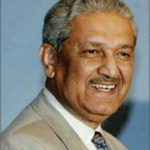

Go to Admin » Appearance » Widgets » and move Gabfire Widget: Social into that MastheadOverlay zone

Author: Dr. A Q Khan
Since time immemorial, man has been attempting to use the resources of the earth for his own well-being so as to live a prosperous and comfortable life. With the passage of time – and as the human mind developed – his requirements increased and he endeavoured to discover nature’s secrets to make them more useful for his life.
Initially the progress was slow, but the process has accelerated over the past few hundred years. Inventions and discoveries now outnumber even human beings themselves. Phenomenal progress has taken place in the field of science after the Second World War, surpassing all previous achievements and it has become difficult, even for experts, to remain up-to-date in their respective fields. Without being a part of this rapid development, we do not have the slightest chance of becoming a developed country.
The unfortunate part of this story, however, is that nowadays most of the scientific developments originate from Western countries such as Europe and the US. In the rest of the world, only the Japanese have shown excellence in research in all the technological fields. Other nations of the world are “users only”, for which they have to pay a high price and which, in turn, prevents them from making significant contributions towards development. The countries of the third world are loitering in the wilderness and are paying the price of ignorance. The one exception is China, which has done a lot of excellent work in the spheres of science and technology and has joined the group of technologically advanced countries.
The position of Pakistan is no different from that if its neighbours in Asia and countries elsewhere in Africa and Latin America. Poverty, hunger and disease are the order of the day. We have done little, if anything, to equip ourselves with advanced technologies. The country is, therefore, surviving on imports and is subjected to the menace of economic pressures from the technologically advanced countries. We cannot afford to continue living in this situation any longer. Not only do we need to make up for lost time, but we also have to march ahead in order to stay abreast of the developed countries.
So far, we have failed to develop our own indigenous scientific, technological and social order. To develop such an order, we need a research-oriented approach in the spheres of both natural and social sciences. We need to take a break from the conventional practices in vogue at our colleges and universities and expose our students to more practical and industrial research so as to improve the state of science and technology in our country – which is now dwindling towards its lowest point.
The same goes for the social sciences. The ideas, theories and dictums emanating from various alien sources dominate our intellectual thought patterns. It is pitiable that a rich and fertile land like ours adopts the philosophies and dictates of foreign minds instead of creating its own vision of how our world should function. We have forgotten the past when we used to lead the world, but, nevertheless, continue to reminisce on its glory.
While on the global level, the rate of technological advancement is tremendous, our national scenario is not entirely enviable. We, as a nation, seem to be oblivious to the gravity of this situation. It is, indeed, sad to realise that in a country where exceptionally talented manpower is available, quality control and research and development activities are almost non-existent. This is causing an unacceptable brain drain. Technological development cannot be achieved without trained manpower, proper infrastructure and the provision of the necessary engineering materials. To train manpower so it can meet the challenges of modern times, a series of specific reforms are needed in the existing educational systems.
There is now growing awareness in Pakistan for the need to set up research facilities and institutions of higher learning in the fields of science and technology – both in the public and private sectors. This awareness led to the establishment of the Ghulam Ishaq Khan Institute of Engineering Science and Technology in Topi, Swabi, the National University of Science and Technology (Nust) in Rawalpindi, the Lahore University of Management Sciences (Lums) and other institutes. The zeal, dedication and motivation of all those affiliated with the many private institutions in Pakistan reaffirm my belief that we, as a nation, are quite capable of building our own future, free from foreign pressures and blackmail, and that we are ready to use available resources to achieve this goal.
A number of factors have to be taken into consideration in deciding where to establish such institutes. These include the population statistics and the economic, industrial and financial structures. Karachi seems to fit the bill perfectly. It is the largest city in Pakistan and also has a strong cosmopolitan appeal. It is a ‘mini-Pakistan’ as people from all provinces living in the city. There is also no dearth of talented students.
I am taking this opportunity to appeal to everyone to do whatever they can to make these institutes equal to any abroad. This includes improving the quality of our secondary and undergraduate education by putting an end to rote-learning and the flagrant practice of cheating during exams, ensuring the proper attendance of both teachers and students, quelling administrative politics and encouraging students to perform practicals which are linked to industry requirements.
Quality education is the first and foremost priority. The cooperation of all stakeholders is needed to achieve this – especially parents, students, teachers and administrators. All of us must work towards the success of these institutes and ensure that more educational facilities are established. Such institutes will serve as a breeding ground for skilled and highly technical manpower in Pakistan and a guarantee for a better future.
(Published in Monthly Tribute International on 01-04-2017)
You must be logged in to post a comment Login